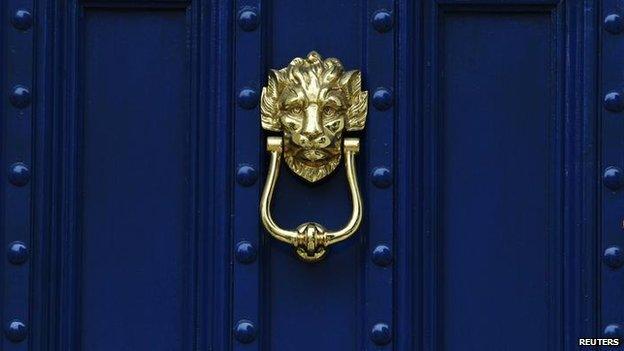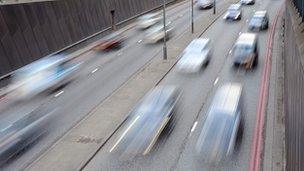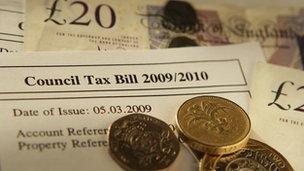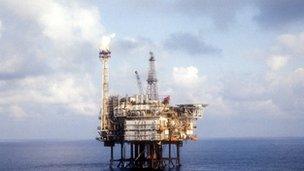Scottish independence: Tax options
- Published

Council tax in Scotland is based on valuations from 1991
New and weighty contributions have added fuel to the heat under the debate about Scotland's public finances after independence.
Nationalists are welcoming them, as they underline the opportunity to do things differently and better.
What's less welcome is that they bring with them some difficult choices.
Road pricing, for instance. As the technology becomes ever more credible and affordable, it makes a sensible replacement for fuel duty and vehicle excise duty.
It relates to road use rather than fixed costs, and can be targeted to charge those who use busy roads at busy times. That way, rural drivers can pay much less per mile than they currently face for essential use.
But try to sell it to the public, as the last Westminster government sought to do, and you come up against the first rule of tax reform; on a tax-neutral reform, the people who lose out make a lot more noise complaining about it than you can expect in thanks from those who gain.
Oil price volatility
The Centre for Public Policy for Regions (CPPR) at Glasgow University has also been at work on the numbers on oil and gas revenue. They've concluded that Scotland could indeed have an oil fund, though they prefer to call it a savings fund.
That confirms the Fiscal Commission report for the Scottish government.

The IFS report suggests a cut in motoring taxes
However, it's gone into detail about how you could get to the surpluses necessary to make it happen, and theory seems to part company from reality.
If you assume the Scottish government would continue its commitment to devolved service spending post-independence, and that it's in favour of retaining welfare spending, then the hole in finances require a huge cut in defence, foreign and overseas development spending.
Out goes the SNP pledge to retain much of Scotland's defence spending footprint - Britain minus the nuclear weapons. It would require cutting to the much more modest level of spending of an Ireland.
The report also goes into detail on the large gap between recent forecasts on oil tax and out-turns. It finds that even the pessimistic projections on oil and gas production have been too upbeat.
It's fallen at a rate that's surprised everyone, including those in the industry who are closest to the new investment pouring in. And while it may rise after a lag for that to kick in, the benefit is not expected to last much beyond 2017-18 before a return to trend decline.
Offshore share
What this paper introduces is a new doubt about the share of UK oil and gas revenue that could come to an independent Scotland. We knew price is unpredictable, and that production levels have produced some nasty surprises for fiscal forecasters.
But we can now also see that the share of tax revenue from Scottish waters ranges between 79% and 95% of the UK total. That's a big variable in how much a Scottish exchequer could hope to rake in.

Council tax bills in Scotland have been frozen since 2007
It's not just down to counting up the reserves and the hoped for flows. It's also a calculation of how much investment has to go into each field, and how much production costs will be.
High investment costs in the harder-to-reach fields, and rapid inflation in extraction costs per barrel are eating into profits. And the tax heading to either the London or Edinburgh treasuries is based on profit.
That means that even if production recovers, it doesn't mean tax will. The only variable that could be a game-changer, it's argued, is a big surge in the oil price. But then, that could knock back the non-oil economy, reducing growth and jobs and landing government with the costs of another downturn.
Booze cruises
Then there's the Institute of Fiscal Studies (IFS). It has been pushing for the UK Treasury to take tax reform seriously, stressing the complexities and anomalies of the current system.
So, the IFS rather likes the prospect of a new form of government with a mandate to do things differently.
An independent Scottish administration could be just the ticket for tax reform. But as the IFS then points out, the Holyrood administration already has the opportunity to reform tax for a fairer and more sensible system, but its failure to do so on council tax "doesn't bode well".
It criticises the failure to revalue property from early 1990s levels, or to remove the regressive elements of squeezing bills of the biggest property owners at the expense of loading the tax burden onto those at the bottom end of the property spectrum.
The reverse criticism is also made - that the council tax freeze since 2007 has reduced the role of property as a base for taxation. Even without independence, there's pressure to shift from tax sources that are easily hidden or moved around.
Gambling and alcohol taxes, for instance, have come down because cross-border and online opportunities to get round them, quite apart from the ways in which smart accountants can move corporate and individuals' earnings between jurisdictions.
With a new border in place, an independent Scotland could attract business north, but it could easily lose out to its southern neighbour if these two countries get into tax competition. The Irish border shows how that can happen in fuel retailing, as did booze cruises across the English Channel. That's why immovable tax sources such as property would probably have to take more of the load.
Congestion costs
The IFS offers some ideas about the ways Scotland could do things differently. It shows that Scots appear to be paying a high price in discouraging traffic congestion, when the problem is much more of an English problem.
The think tank calculates that the average extra kilometre of Scottish driving puts a cost on other drivers of 6.3 pence, whereas the external cost in England and Wales is 12.3 pence (or 9p outside London). So motoring taxes could come down - until, that is, you try to get it past the environmental lobby.
And how about following the IFS advice to the Treasury to remove the zero VAT rating on food, children's clothes, newspaper and books, compensating lower income households through the welfare system?
That would extend to raising VAT on household fuel bills from 5% to 20%? Well, good luck with that, minister.
As it happens, the IFS plan was drawn up with Professor James Mirrlees, the Nobel laureate and tax expert who is also on the Fiscal Commission working up a tax paper for imminent publication by the Scottish government.
Vice taxes
The figures we've got suggests Scots pay roughly the same in onshore (non-oil) tax as the UK average, but not all from the same sources. Scots pay less in income tax, partly because there's a lower proportion of tax paying the top rate, which is levied on earnings over £150,000.

The report also addressed the issue of oil revenues
As a result, it would be harder to use the tax system to redistribute income. Scots are already more equal on that count than the UK, says the IFS. The options for squeezing the rich till the pips squeak might have political appeal, but wouldn't produce much in the way of juice.
Scots appear to pay less in capital gains tax, perhaps because they have fewer investments to get caught in that net - though it's hard to separate out the numbers within the UK data.
Where the Scots pay significantly more is in vice taxes on gambling, smoking and alcohol, which together provide nearly 5% of the tax total. And the IFS has an interesting observation on booze. It's not necessarily that Scots drink more heavily. The Institute's take is that the drinks of choice in Scotland are more likely to be spirits, taxed at a higher level per unit than wine or beer.
And yet the option to use tax powers to reverse that goes against the grain of Scottish government policy, which is to increase prices for health reasons. Higher tax could replace minimum unit pricing, handing the added revenue to the government rather than the retailers.
Closing the gap
So the message is that few of these options for reform are easy. And that's apart from the pressure the IFS highlights for an independent Scotland to get its inherited deficit under control.
It is reckoned that the challenge would be at least as big as the UK's austerity squeeze - to get spending down by £2.5bn at today's prices by 2017-18.
Throw into that the (contested) forecast of falling oil and gas tax, which could add a whopping £3.4bn to that deficit within four years.
How much would it take it to close that gap? The IFS does the sums, calculating that 1p extra on basic and higher rate tax would raise £430m. A similar amount would be brought in by 1 percentage point on the 20% VAT rate.
So if you ignore the falling oil tax projection, and load all the pressure on to tax rather than spending cuts, it means the deficit could be closed by putting up the basic rate of income tax from 20 to 26p, or VAT up from 20% to 26%.
Of course, you'd want to do neither, as that would choke off demand and hurt recovery, without which the tax picture would get worse again.
That's just an illustration of the challenge facing the country, whether it's a 'yes' or a 'no'.